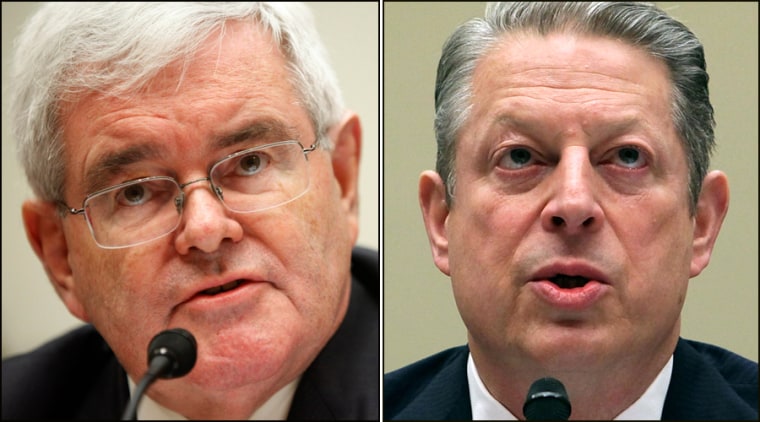Former Vice President Al Gore and former House Speaker Newt Gingrich faced off Friday before lawmakers, each on opposite sides of major climate and energy legislation. The Democrat compared the bill's significance to civil rights laws, while the Republican dismissed it as "micromanagement" that invites corruption.
Both testifed on the fourth and final day of a hearing before the House Energy and Environment Subcommittee.
Gore described the draft bill to curb greenhouse gas emissions and promote renewable energy as "one of the most important pieces of legislation ever introduced in the Congress."
"I believe this legislation has the moral significance equivalent to that of the civil rights legislation of the 1960s and the Marshall Plan of the late 1940s," he said in his opening statement.
Gore said the legislation would simultaneously solve the problems of the climate, economy and national security.
The bill calls for a reduction of carbon dioxide and other greenhouse gases by 20 percent from 2005 levels by 2020, and 83 percent by mid-century. It also would require utilities to produce a quarter of their electricity from renewable sources by 2025.
Gore predicted passing it would "restore America's leadership in the world and begin, at long last, to solve the climate crisis."
"I think the cost of energy will come down when we make this transition to renewable energy," said Gore, who predicted economic costs would be much greater if global warming is not reined in by a shift from the use of fossil fuels. Other Democrats argued that the development of renewable and energy efficient technologies will produce jobs and mitigate cost increases.
Gore also listed examples of what rising temperatures are already doing to the planet. He spoke of Arctic warming, melting Greenland ice sheets, and how increasingly acidic seas are striking seashells and coral reefs with a type of osteoporosis.
Gore urged the House panel to make sure the bill includes provisions to protect any Americans who face undue hardship, such as workers in carbon-intensive industries who could lose their jobs.
Wrong bill, Gingrich says
Gingrich argued that the bill would increase electricity rates for consumers by forcing power companies to institute costly measures to reduce carbon dioxide emissions.
In his prepared remarks, he also said the bill would create a massive bureaucracy and "micromanagement" that "are an invitation to corruption and an invitation to more politicians playing games. The idea that the Secretary of Energy is now going to be the czar of Jacuzzis is just absurd."
Gingrich, who led a Republican-dominated House from 1995-1999, was added to the lineup late Thursday at the request of Republicans.
While he has urged fellow conservatives to play a role in crafting climate and energy policy, he has been critical of the Democratic drafted bill before Congress.
Gingrich did point out two parts of the bill he liked: the development of a smart electric grid to prevent blackouts and make energy transmission more efficient; and the promotion of what he called "green coal technology," which involves finding a way to capture and store carbon from coal-fired power plants responsible for half of the nation's electricity.
Overall, he said, the bill penalizes consumers more than it incentivizes technological solutions.
"It is ridiculous to believe that we are going to eliminate 83 percent of carbon use with current technologies," he added. "This is the strategy imposed in the bill and it is a fantasy. Nothing in this bill leads to the level of breakthrough that you need to reduce carbon not only here at home but also reduce carbon generated by China and India."
During the four days of panels and testimony, more than 50 witnesses espoused on the nitty-gritty details of the 648-page draft bill.
Gore, who shared a Nobel Peace Prize for his work on global warming, has championed the need to address climate change for more than a dozen years.
Gingrich, for his part, has resurfaced as a leading Republican voice, and has indicated he may seek the presidency in 2012.
Cap and trade, or not?
The measure would cap greenhouse gas emissions, including carbon dioxide from burning fossil fuels. Under a compromise being discussed, a large portion of these emission permits would be given away, while others would be auctioned with much of the revenue to be redistributed to ease the impact of higher energy costs.
Rep. Joe Barton of Texas said Republicans are putting together their own climate proposal that would scrap the "cap-and-trade" system. He said the GOP proposal, yet to be unveiled, will call for expanding nuclear energy and pumping more money into ways to capture carbon from coal-burning power plants.
While Republicans were critical, some Democrats expressed concern as well.
"How do we protect our people?" asked Rep. John Dingell, D-Mich., whose state is reeling from the economic recession and is home to many energy-intensive industries, including the ailing auto industry. Dingell said he's not convinced the bill will protect U.S. jobs, especially if China isn't forced to take similar actions.
"If the United States leads, China will follow," Gore argued.
The Obama administration broadly endorsed the legislation, although some issues — such as allocating the pollution permits — have yet to be worked out.
Democratic sponsors of the bill hoped Friday's testimony of former Sen. John Warner, R-Va., might sway some GOP lawmakers.
Warner said dealing with the climate issue is essential for national security and the sake of future generations — even if there are economic consequences.
"Is this the time to challenge an issue of this magnitude which has ramifications of cost to everyone here in this country and is going to require sacrifices. I say to you, yes, it is the time," Warner said.
